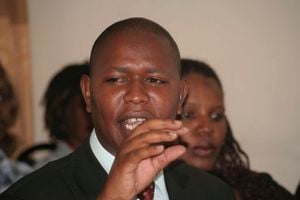English city that played host to black liberation movement

Manchester City players celebrate becoming English Premier League champions in a parade leaving from Mancheter Town Hall in Manchester, northwest England, on May 14, 2012.
What you need to know:
- For Jomo Kenyatta, the Manchester Congress was the space to unveil the “burning spear” in him, reckons Makonnen.
- At the Manchester Conference, Kenyatta was assigned the visible role of chair of the credentials committee.
Next month, Britain’s University of Manchester holds celebrations to mark the 75th anniversary of the famous 1945 Manchester Pan-African Congress.
The mainly virtual two-week festivities will be to rekindle memories of the conference that laid the strategy to hasten the end of colonial rule in Africa and the Caribbean, and was a springboard for black leadership that took over at independence.
The story of the six-day event 75 years ago is best captured in the memoir of an adopted Kenyan of Caribbean extraction, freedom fighter, and pan-Africanist, Ras Makonnen, who died in 1982 and is interred at the Lang’ata Cemetery.
“One place where Africans like Jomo Kenyatta and Kwame Nkrumah could be seen as professional rebels was at the Pan-African Congress in Manchester,” writes Makonnen. “This was obviously an important occasion for projecting the African leadership upon a wider audience. A man like Kenyatta was much more obviously marked for leadership than many others in England at the time. There was a fascination about him... something natural in the man which singled him out in a crowd.
“We had all the conveniences in Manchester. I had succeeded in establishing myself as a businessman in the town. (Makonnen owned a chain of restaurants and lodges in Manchester, one of which was managed by Kenyatta). That made it relatively easy to get halls booked for the congress, and simplified the question of hotel accommodation as I had a number of houses where people could be put up, and had no difficult in feeding the delegates.
Historic moment
“The timing of the congress was fixed at a historic moment to coincide with World Conference of Trade Unions in Paris. Manchester had become quite a point of contact for Africans in Britain, and we had made a name for ourselves in fighting various areas of racial discrimination.
Looking at our numbers and activism in Manchester, you could say that we Africans had a unity of purpose, maybe because of shared history of old age slavery and looting of our resources to build European and American capitals and industries, then colonialism.
“We also felt we had in a way come to stir up that other side of Manchester — its fierce anti-slavery streak.”
The author explains: “I saw myself as Friendrich Engels (the philosopher-author) whose father had made a lot of money in Manchester and was able to support Karl Marx (the architect of communism movement) in his great undertaking.”
For Jomo Kenyatta, the Manchester Congress was the space to unveil the “burning spear” in him, reckons Makonnen.
“Manchester gave us an important opportunity to express and expose the contradictions, the fallacies, and the pretensions that were at the very centre of the (British) empire. In England, we had built up a network of strategic committees for the welfare and defence of the black people. Then there was the international side of the conference. It was important to make the link with the Caribbean, Asia, and even North America. For regardless of how America may try to disguise black progress, there were numbers of highly trained blacks there whose expertise and experience we wanted to tap.”
* * * * *
At the Manchester Conference, Kenyatta was assigned the visible role of chair of the credentials committee. He also had a presentation in form of a booklet he had published titled Kenya: The Land of Conflict. On the cover of the publication was a picture of Kenyatta in a fur cloak hanging from one shoulder and holding a spear. It is from the cover design that he would acquire the title Burning Spear of Kenya.
That summer Britain held a General Election and there was talk in Manchester that blacks should field a candidate to articulate the African view. Kenyatta was among those suggested. He had lived in the UK for 15 years and witnessed three other elections, hence had an idea how to mount a campaign. However, the urge to lead the fight from home and not on European soil prevailed, and he returned to Kenya.
Mau Mau rebellion
Significantly, the Manchester Congress closed on a resolution that reverberated with growing tensions in Kenya in the countdown to the outbreak of the Mau Mau armed rebellion. The resolution read: “The delegates to the Fifth Pan-African Congress believe in peace. Yet if the Western world is still determined to rule mankind by force, then Africans, as a last resort, may have to appeal to force in the effort to achieve freedom.”
Postscript: Two siblings of the 1945 Manchester Congress key organiser, Ras Makonnen, have kept the pan-African flame alive. Son Desta, who lives in Ghana, is a keen follower and collector of works that promote Africanism and the cause of the blacks anywhere in the world. So is his sister Tishai, who lives and works in Nairobi. She is the one who lent me the treasured copy of her father’s memoir.
Early this year she joked to me that in the morning when she passes past the State House gate on her way to work, she feels like popping in to say hi to “my brother” (President Uhuru Kenyatta) and reminisce about the days their fathers ran restaurants in Manchester.
I teased her that in two years’ time, her “brother” will be out of State House, so she most likely will meet him at his favourite nyama-choma joint in Nairobi’s Hurlingham.





